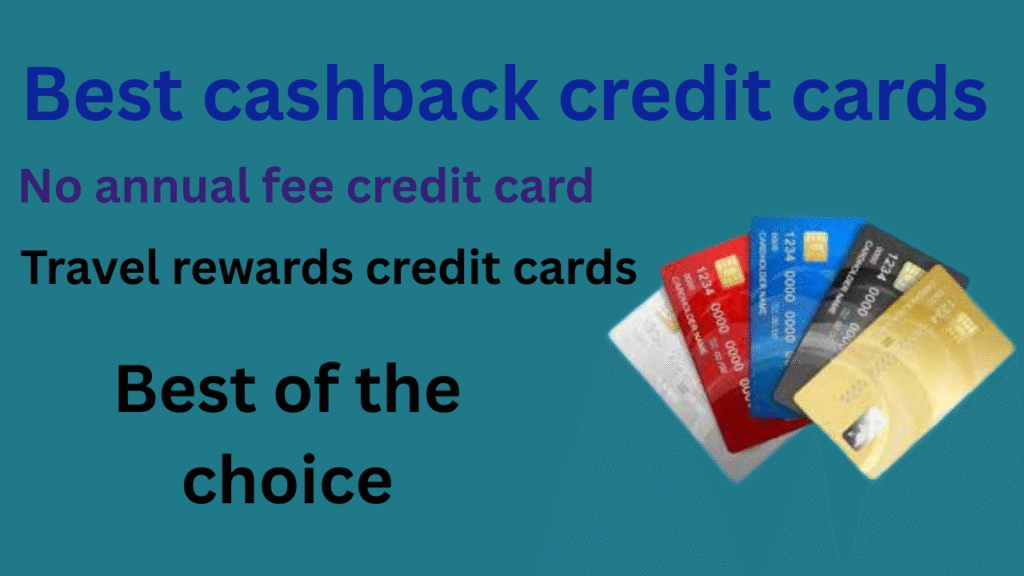A credit card is a plastic or metal card issued by a bank or financial company that lets you borrow money up to a certain limit to pay for goods or services. You repay the amount later—either in full or over time—with or without interest.
1. Citi Double Cash Card
Best for: Flat-rate cashback
-
Cashback: 2% on everything (1% when you buy, 1% when you pay)
-
Annual Fee: $0
-
Intro APR: 0% on balance transfers for 18 months
-
Why it’s great: No categories to track, reliable for all purchases.
2. Wells Fargo Active Cash Card
Best for: High flat-rate and welcome bonus
-
Cashback: 2% unlimited on all purchases
-
Annual Fee: $0
-
Bonus: $200 after $500 spend in 3 months
-
Intro APR: 0% for 15 months on purchases & balance transfers
-
Why it’s great: Combines high cashback with great welcome bonus and intro APR.
3. Chase Freedom Unlimited
Best for: Mixed spending & travel points
-
Cashback:
-
5% on travel via Chase Ultimate Rewards
-
3% on dining & drugstores
-
1.5% on all other purchases
-
-
Annual Fee: $0
-
Bonus: $200 after $500 in 3 months + 5% on grocery store purchases (up to $12,000)
-
Why it’s great: High rewards for everyday and travel spending.
4. Discover it Cash Back
Best for: Rotating categories
-
Cashback: 5% on rotating quarterly categories (e.g., gas, Amazon, groceries — up to $1,500); 1% on everything else
-
Annual Fee: $0
-
Bonus: Cashback match – all cash back you earn in Year 1 is doubled
-
Why it’s great: Ideal if you can maximize rotating categories.
5. Blue Cash Everyday Card from American Express
Best for: Supermarkets, gas, and online shopping
-
Cashback:
-
3% at U.S. supermarkets (up to $6,000/year)
-
3% U.S. online retail
-
3% at U.S. gas stations
-
1% elsewhere
-
-
Annual Fee: $0
-
Bonus: $200 after $2,000 spend in 6 months
-
Why it’s great: Perfect for family and daily household expenses.
Recommendation Summary:
| Card | Cashback Rate | Annual Fee | Best For |
|---|---|---|---|
| Citi Double Cash | 2% on everything | $0 | Simplicity & reliability |
| Wells Fargo Active Cash | 2% + bonus | $0 | Flat-rate + bonus & intro APR |
| Chase Freedom Unlimited | 1.5%-5% | $0 | Mixed rewards + travel |
| Discover it Cash Back | 5% rotating categories | $0 | Maximizers + Cashback Match |
| Amex Blue Cash Everyday | 3% groceries, gas, online | $0 | Family expenses & shopping |

Key Features of a Credit Card:
Borrow Now, Pay Later: You can buy things even if you don’t have the cash immediately.
Credit Limit: The maximum amount you’re allowed to spend on the card.
Monthly Bill: You’ll get a bill each month showing what you spent.
Interest Charges: If you don’t pay the full amount, interest is added to the balance.
Minimum Payment: A small amount you must pay monthly to keep the account in good standing.
Common Uses of Credit Card:
Shopping online and in stores
Building credit history
Travel bookings (hotels, flights)
Emergency purchases
Benefits:
Rewards (cashback, points, miles)
Fraud protection
Credit score building
Purchase protection and insurance
Risks:
- High interest if not paid on time
Can lead to debt if overspent
Late payments hurt your credit score
General Credit Card FAQs
1. What is a credit card?
A credit card is a financial tool that allows you to borrow money from a bank to make purchases. You repay it later, either in full or over time with interest.
2. How does a credit card work?
You can use a credit card to make purchases up to a set limit. At the end of your billing cycle, you’ll receive a statement. You can either pay the full amount or make a minimum payment and carry the balance forward.
3. What is the difference between a credit card and a debit card?
A debit card uses your own money from your bank account. A credit card lets you borrow money from the bank and pay later.
4. What are the benefits of using a credit card?
Earn cashback or rewards points
Build your credit score
Fraud protection
Emergency purchases
Purchase protection and travel insurance
5. What happens if I don’t pay my credit card bill on time?
Late payments can lead to:
Interest charges
Late fees
Damage to your credit score
6. What is a credit limit?
Your credit limit is the maximum amount you can borrow on your credit card. It’s set by your card issuer based on your credit history and income.
7. Do I need a good credit score to get a credit card?
Not always. Some cards are designed for people with no credit or poor credit (secured or student cards), while premium cards require a higher score.
8. Can I get a credit card with no annual fee?
Yes, many credit cards offer no annual fees, especially cashback or starter cards.
9. Which credit card is best for cashback?
Some top cashback credit cards in 2025 include:
Citi Double Cash® (2% flat-rate)
Wells Fargo Active Cash®
Discover it® Cash Back (5% rotating categories)
10. How can I apply for a credit card?
You can apply online through a bank’s website or financial institution. You’ll need to provide personal, financial, and employment information.